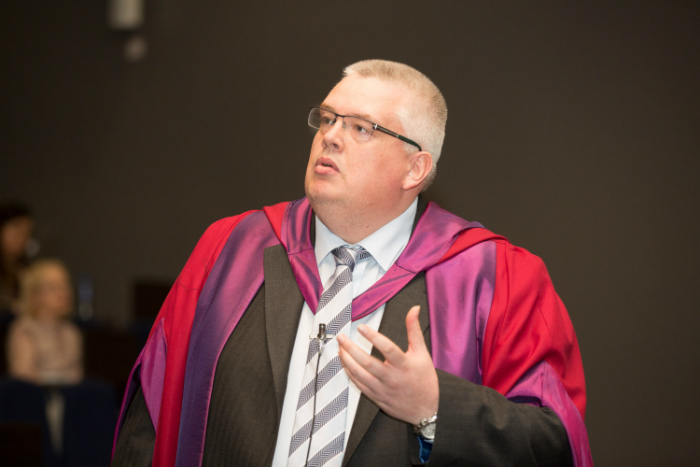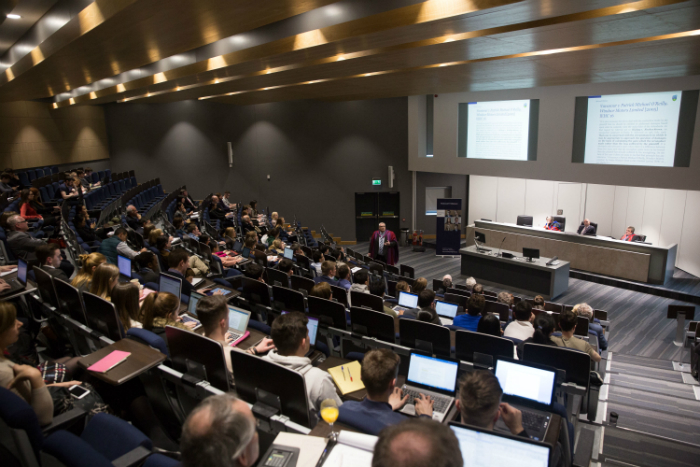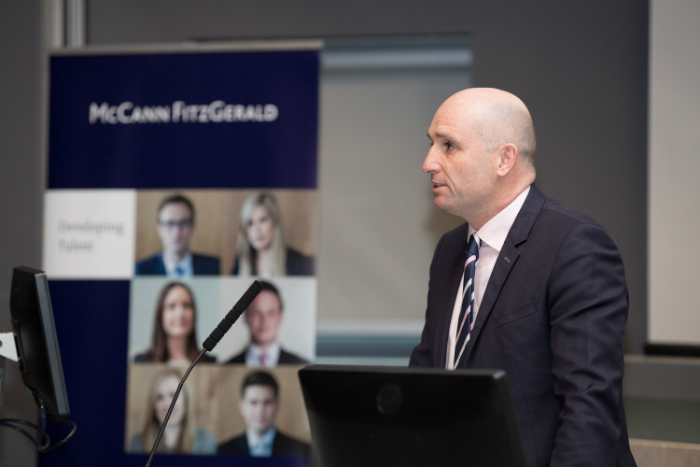Devenney Inaugural Lecture
News
- New “Equality & Diversity Law” Professional Certificate
- Milestone Reunion of the Classes of 1985, 1995, 2005, and 2015
- Professor Oonagh Breen appointed to The Law Reform Commission
- French Ambassador, H.E. Céline Place, and guests attend our Soirée du droit 2025
- The “RIGHTS TO UNITE” Conference October 2025
- Professor Cathryn Costello appointed to Irish Human Rights and Equality Commission
- Four Distinguished Adjuncts appointed to UCD Sutherland School of Law Faculty
- UCD Alumni Award in Law 2025 honours Sarah Keane
- Seminar with Council of Europe Commissioner for Human Rights, Michael O'Flaherty, on Europe’s Human Rights Challenges
- UCD Sutherland Opportunity Bursary
- Dr Mina Hosseini and Professor Imelda Maher guest edit The Journal of Law, Medicine & Ethics
- Athena Swan Re-Bronze Awarded to UCD Sutherland School of Law
- Conor Gearty RIP
- Three New Faculty Appointed to UCD Sutherland School of Law
- Chief Justice, Mr Donal O’Donnell, awarded UCD Honorary Doctorate
- UCD to host the largest public law conference ever held in Ireland July 2026
- Chief Justice chairs opening plenary at Public Law Conference 2025
- Dr Niamh Howlin awarded prize for Outstanding Contribution to Legal Scholarship
- Celebrating a Decade of Fitzpatrick Family Foundation Research
- Conference for Early Career Academics on ‘Interdisciplinarity and Law’
- UCD Law Students win Cape Town Convention Moot Competition
- New Partnership announced with Matheson
- UCD scholarship honours late Declan McCourt
- UCD Environmental Law Field Trip to Brussels
- Taoiseach Micheál Martin launches Dr Niamh Howlin’s book marking the 50th Anniversary of the Offfice of the DPP
- Book Launch: Bridging the Gender Pay Gap through Transparency
- John M Kelly lecture 2025 delivered by Professor Kim Scheppele of Princeton
- Guest lecture by Mr Michael McGrath
- Professor Ian O'Donnell wins another book award!
- News 2024
- News 2023
- News 2022
- News 2021
- News 2020
- News 2019
- News 2018
- News 2017
- Walsh Lecture 2017
- PhD Graduations 2017
- Award of Honorary Doctorate
- Roman Tomasic Lecture
- Guest Lecture Employment Law 2017
- 2017 Reunion
- Restorative Justice Book Launch
- EU Field Trip 2018
- Law Review 2017
- ENVREG Climate Litigation Seminar
- Competition Law in Hong Kong & Ireland
- RIA PhD Seminar
- 41st Bank of Ireland Student Awards
- Insights into Non Law Careers for Law Graduates
- Caoilfhionn Gallagher QC honoured with Law Alumni Award 2017
- Dr Lynsey Black presents at ‘Human Rights in Focus’
- College Teaching Awards
- FET Entry Route
- Legal Scholars Conference
- University Teaching Awards
- 2017 Graduation
- Doctorate Graduations
- Ad Astra Athletes
- Arthur Cox Student Awards 2017
- Class of 2017
- Joint UCD-Queens PhD Workshop
- BLREG Seminar
- Summer Internships
- Profession Diploma Employment Law Graduation
- EU Judges Training
- Law and the Family
- 19th Annual Irish European Law Forum
- Criminology Lecture June
- Fulbright Award
- Rest Here Installation
- Mason Hayes Curran Prize
- Professional Regulation Seminar
- McCann FitzGerald sponsors students for Olso Competition
- Human Rights Teacher Training
- Students Human Rights Programme
- Brexit and Human Rights
- Matheson Sponsored PhD
- Mooting and Debating
- Study Visit to London
- Devenney Inaugural Lecture
- Alumni Reception in Brussels
- Bar Council of India
- Gradireland National Student Challenge
- Post Brexit Legal Landscape
- Conor White, Law with Economics, receives UCD Astra award
- The John M Kelly Memorial Lecture 2017
- SLS Reception at Irish Embassy
- UCD Sutherland School of Law Number 1 in Ireland in QS Rankings
- UCD - Riga Colloqium
- Human Rights Clinic - Conversation with Magdalene Survivors
- President Deeks Presents Student Awards
- A Celebration of UCD Sutherland School of Law
- Modern International Law
- UCD Law Students win Irish Times Debate 2017
- Keane on Company Law
- Workshop on Bitcoin and Blockchain
- Fundamentals of the Irish Legal System
- News 2016
Professor Devenney Delivers Inaugural Lecture

Professor James Devenney, the new McCann FitzGerald Chair of International Law and Business at University College Dublin’s Sutherland School of Law, yesterday delivered his inaugural lecture entitled "Spies, Parking Tickets, Illegal Transactions and Insider Dealing”. Professor Devenney reflected on four recent cases which fundamentally alter our understanding of Contract Law and have wide-reaching implications for lawyers and businesspeople alike.
Professor Devenney is currently overseeing the prestigious Master’s Degree in International Law and Business offered jointly by the UCD Sutherland School of Law and the UCD Smurfit Graduate School of Business. This programme, established in 2014, offers an innovative degree for students who have successfully completed an undergraduate degree in law, business or related disciplines.


Commenting on Professor Devenney’s lecture, Barry Devereux, Managing Partner of McCann FitzGerald said, “James is widely recognised as a world-leading expert on Transactional Commercial Law and his inaugural lecture showed why his insight is so valuable to international business and law, and particularly important in uncertain times for trade globally. At McCann FitzGerald we are very proud to have him represent our firm in the legal educational world and we look forward to building on our ongoing support of the Chair.”
Professor Imelda Maher, Deputy Dean of UCD Sutherland School of Law said, “We were delighted that Professor James Devenney took up the role as McCann FitzGerald Chair in International Law and Business. His insightful and thought-provoking inaugural lecture is a real demonstration of the expertise he has already brought to the position and we look forward to him continuing to build on this work.”
Professor Devenney chose four cases to represent some important recent and ongoing developments in the law of contract in the UK and Ireland. The first was Attorney General v Blake [2001] 1 AC 268 concerning the proper method of assessing damages for breach of contract if the breach has generated a profit for the defendant without a corresponding loss for the plaintiff. The House of Lords held that, in exceptional cases, it may be just and equitable to order the defendant to pay damages corresponding to some or all of the profit made, where the plaintiff's interest in performance of the contractual obligation warrants this. It remains unclear how exceptional this should be, where the notion of an "efficient breach" (ie that society benefits by allowing a defendant to retain whatever profit from the breach that exceeds the plaintiff's loss) now stands and how Blake relates to cases on damages for a lost opportunity to bargain for the defendant's release from the contract.
The second case that Professor Devenney examined was ParkingEye Limited v Beavis [2016] AC 1172. The UK Supreme Court here rejected the sharp distinction between a penalty clause (unenforceable) and a genuine pre-estimate of the damage caused by a breach of contract (enforceable). Instead, the court should examine a provision by asking whether the "the impugned provision is a secondary obligation which imposes a detriment on the contract-breaker out of all proportion to any legitimate interest of the innocent party in the enforcement of the primary obligation." (Lord Neuberger and Lord Sumption). As with Blake this emphasizes the injured party's interest in performance and requires a more sophisticated analysis of this than the nineteenth centuries cases employed. It is not fully clear how this new approach will be applied and how it relates to the law on relief against forfeiture.
(opens in a new window)James Devenney Lecture from (opens in a new window)UCD Sutherland Law on (opens in a new window)Vimeo.
Professor Devenney finished by looking at two cases - Patel v Mirza [2016] UKSC 42 and Quinn v Irish Bank Resolution Corporation Ltd (In Special Liquidation) [2015] IESC 29. The highest courts in England and Wales and in Ireland agree that the law in relation to the enforceability of illegal contracts (and restitution of money paid or property transferred under them) needs to be more flexible. However, if the prevailing view in England and Wales is that the circumstances of each case need to be assessed (such as the seriousness of the breach or the degree of culpability of each party), the Irish position is that each statutory scheme should be analysed to decide what the consequences of illegality should be, but that all cases falling within each statute should be treated alike.